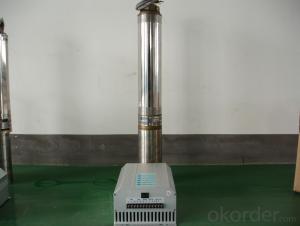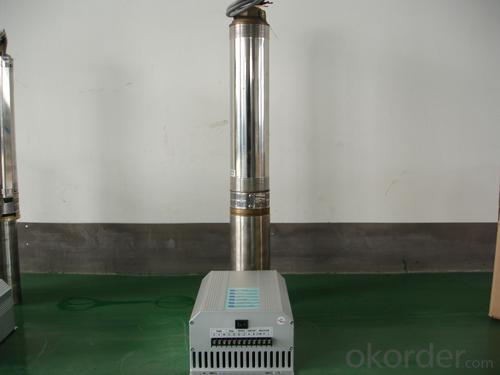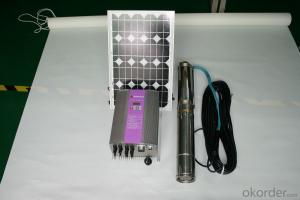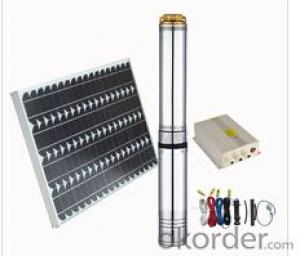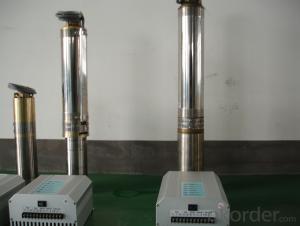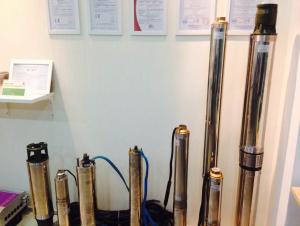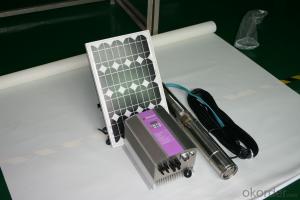Solar Pump Price for Solar Water Pump (110v)
- Loading Port:
- China Main Port
- Payment Terms:
- TT OR LC
- Min Order Qty:
- -
- Supply Capability:
- -
OKorder Service Pledge
OKorder Financial Service
You Might Also Like
Item Description :
This superb new addition to our solar fountain range comes with a 10w solar panel,and a powerful fountain pump that is capable of producing fountains of up to 2m in height. As well as being easy to set up and use.Instruction manual is supplied for assembly and maintenance.
Solar Fountain Key Features :
Powered by direct sunlight
No high voltage electric mains required
Safe for children
Max. height of fountain: 2M
Max. flow capacity: 800 L/H(176 GAL)
10W Polycrystalline solar panel included
18V DC brushless pump
Solar Pump Features :
Can produce fountains up to : 2M (tube height) 1.4M (fountain height)
Comes with multiple nozzle accessories
Cable Length : 5M
Solar Panel Features :
10W peak power.
Polycrystalline highly efficient solar panel
Comes mounted in aluminium frame
Comes with ground stake and rotating knob so you can angle your panel toward the sun
What You Will Get :
10W solar panel
Solar pump
Ground Sake
Nozzle accessories
Precautions :
DO NOT alter or change the product itself or its components
Operate pump in freshwater only, never above 50 degrees celsius
Keep away from flammable liquids
Do not connect to any other power supply other than the included
- Q: Can a solar pump be used for water circulation in hot tubs or spas?
- Yes, a solar pump can be used for water circulation in hot tubs or spas. Solar pumps are designed to circulate water using energy from the sun, making them an eco-friendly and cost-effective option for water circulation. They can help maintain the desired water temperature in hot tubs and spas, ensuring a comfortable and enjoyable experience for users. Additionally, solar pumps are typically low maintenance and durable, making them a reliable choice for water circulation in these types of recreational settings.
- Q: Can a solar pump system be expanded or upgraded in the future?
- Indeed, a solar pump system possesses the capacity for future expansion or enhancement. These systems are designed with modularity and scalability in mind, enabling effortless expansion to cater to the user's specific demands. To augment the system's power output, one can incorporate supplementary solar panels, thereby facilitating the operation of more pumps or larger pumps. Furthermore, the capacity of the battery bank can be heightened to store surplus energy generated throughout the day for utilization during nighttime or periods of diminished sunlight. Moreover, the control system and monitoring equipment can be upgraded to encompass advanced features, such as remote monitoring and automation. In summary, the adaptability and modularity inherent in solar pump systems ensure their remarkable potential for expansion and enhancement, allowing them to seamlessly conform to evolving requirements and technological advancements in the forthcoming years.
- Q: Can a solar pump be used in areas with high snowfall or ice conditions?
- A solar pump can indeed be used in areas with high snowfall or ice conditions. While extreme weather conditions may present challenges for solar panels, there are multiple ways to ensure the proper functioning of a solar pump in such regions. Firstly, the solar panels can be installed at an angle to facilitate the easy sliding off of snow. Additionally, anti-icing coatings or heating elements can be integrated into the panels to prevent the accumulation of ice. Moreover, the pump system can be designed with freeze protection mechanisms like insulation and heat tracing to avoid the freezing of water or pipes. By implementing these measures, solar pumps can effectively operate in areas with high snowfall or ice conditions, serving as a dependable and sustainable water pumping solution.
- Q: Can a solar pump be used for fire hydrant systems in rural areas?
- Yes, a solar pump can be used for fire hydrant systems in rural areas. Solar pumps are powered by solar energy, which makes them a suitable and sustainable solution for remote locations where there may not be access to electricity. These pumps use photovoltaic panels to convert sunlight into electricity, which is then used to power the pump. This eliminates the need for fossil fuels or grid electricity, reducing operational costs and environmental impact. Solar pumps are capable of providing sufficient water pressure and flow rates required for fire hydrant systems. They can be integrated with appropriate storage tanks to ensure a consistent water supply, even during periods of low sunlight or at night. Additionally, solar pumps are generally reliable and low-maintenance, making them ideal for rural areas with limited resources for repair and maintenance. Using solar pumps for fire hydrant systems in rural areas can greatly improve firefighting capabilities, as it provides a reliable and sustainable water source. Moreover, it eliminates the need for costly infrastructure developments, such as extending electrical lines or installing generators. Overall, solar pumps offer an efficient and environmentally friendly solution for providing water to fire hydrant systems in rural areas.
- Q: How does the performance of a solar pump vary with different water sources (e.g., well, river, lake)?
- Depending on the water source, such as a well, river, or lake, the performance of a solar pump can vary. When using a well as the water source, the performance is generally favorable due to consistent water levels. This allows for a steady and reliable output from the solar pump. Factors like the depth of the well, flow rate, and water quality can also affect the pump's performance. However, as long as the solar pump is properly sized and designed for the well, it can efficiently and sustainably pump water. Using a solar pump with a river as the water source presents challenges. Rivers rely heavily on rainfall and can have fluctuating water levels. During dry seasons or droughts, the flow rate of the river can significantly decrease, impacting the pump's performance. Moreover, rivers may carry sediment, debris, or contaminants, which can affect the pump's efficiency and lifespan. Therefore, using proper filtration and maintenance measures is crucial when using a solar pump with a river as the water source. Similarly, using a solar pump with a lake as the water source requires careful consideration. Lakes can have varying water levels depending on the season, rainfall, and other factors. If the lake experiences significant fluctuations in water level, it can impact the performance of the solar pump. Additionally, the water quality in the lake, including the presence of algae, sediment, or pollutants, can affect the pump's efficiency and longevity. In such cases, adequate filtration and regular maintenance are essential. In conclusion, the performance of a solar pump is influenced by the characteristics and conditions of the water source, whether it's a well, river, or lake. Proper sizing, design, filtration, and maintenance are crucial factors to ensure the optimal performance and longevity of a solar pump, regardless of the water source.
- Q: How does a solar pump handle water source contamination from oil spills?
- A solar pump does not directly handle water source contamination from oil spills. However, it can be used to pump clean water from an unaffected source to the affected area, helping to dilute and disperse the oil spill. Additionally, solar-powered technologies can also be used in conjunction with other oil spill cleanup methods such as skimmers and booms to aid in the removal of oil from the water.
- Q: Are there any safety measures or precautions to consider when using a solar pump?
- Yes, there are several safety measures and precautions to consider when using a solar pump: 1. Electrical Safety: Solar pumps may generate electricity, so it's important to follow electrical safety guidelines. Ensure that all wiring and connections are properly insulated and protected from water or physical damage. Use a circuit breaker or disconnect switch to shut off power when performing maintenance or repairs. 2. Water Safety: When working with a solar pump that draws water from a well or pond, be cautious of potential water contamination. Use a suitable filtration system to remove impurities and regularly clean and disinfect the water source. Additionally, ensure that the pump is properly sealed to prevent water from entering critical components. 3. Overheating Prevention: Solar pumps rely on sunlight to generate power, and excessive heat can reduce their efficiency or damage components. Install the pump in a shady area or use a protective cover to shield it from direct sunlight, especially during peak hours. Regularly check for any signs of overheating, such as melted wires or burnt smells. 4. Maintenance and Inspection: Regular maintenance and inspections are crucial to ensure the safe and efficient operation of a solar pump. Follow the manufacturer's guidelines for routine checks, cleaning, and lubrication. Inspect the pump's components, such as panels, wiring, and valves, for any signs of wear or damage. Promptly address any issues to prevent further complications. 5. Installation and Mounting: When installing a solar pump, carefully follow the manufacturer's instructions and guidelines. Ensure that the pump is securely mounted to prevent any accidental falls or damage. Use appropriate mounting brackets or structures that can withstand the weight and environmental conditions. 6. Training and Education: It is essential to have adequate knowledge and training on the operation of solar pumps. Understand the pump's specific features, controls, and safety precautions. If necessary, seek professional assistance or training to ensure safe and effective use. By following these safety measures and precautions, users can minimize the risk of accidents, optimize the performance of their solar pump, and ensure its longevity.
- Q: Can a solar pump be used for water supply in coffee plantations?
- Yes, a solar pump can be used for water supply in coffee plantations. Solar pumps are an efficient and sustainable solution for providing water to agricultural areas, including coffee plantations. They can harness solar energy to power the pump, eliminating the need for grid electricity or fuel. This makes them cost-effective and environmentally friendly, while ensuring a reliable water supply for irrigation and other water needs in coffee plantations.
- Q: What is the maximum water depth that a solar pump can reach?
- The maximum water depth that a solar pump can reach depends on various factors such as the power and efficiency of the solar panels, the capacity and design of the pump, and the availability of sunlight. However, in general, solar pumps can typically reach depths of up to 100 meters or more.
- Q: Can a solar pump be used in areas with harsh weather conditions?
- Yes, solar pumps can be used in areas with harsh weather conditions. They are designed to withstand extreme temperatures, heavy rainfall, and even snow. They are built with durable materials and often have weatherproof enclosures to protect the pump and its components. Additionally, solar pumps are highly reliable and can continue to operate efficiently in challenging weather conditions, providing a sustainable and efficient water pumping solution.
Send your message to us
Solar Pump Price for Solar Water Pump (110v)
- Loading Port:
- China Main Port
- Payment Terms:
- TT OR LC
- Min Order Qty:
- -
- Supply Capability:
- -
OKorder Service Pledge
OKorder Financial Service
Similar products
Hot products
Hot Searches
Related keywords
